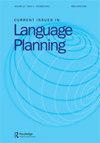学习语言:实施印度多语种教育政策的框架
IF 1.8
1区 文学
Q2 EDUCATION & EDUCATIONAL RESEARCH
引用次数: 3
摘要
摘要本文提出了一个在教育政策实施中使用多语言的框架,作为对印度最近的《2020年国家教育政策》(GOI,2020)的批判性建设性回应。植根于印度现有的教育语言政策,我们认为,我们的语言包容性“学习语言”(LFL)框架在结构上是灵活的、社会文化上可行的、经济上可行的,在学术上也是相关的。它旨在促进公平,并确保第一语言支持和认知独立。在介绍该框架之前,我们批判性地回顾了《2020年国家环境政策》中提供的多语言政策指导,然后主要基于当前的跨语言理论为LFL框架奠定了理论基础,还讨论了印度备受诟病的三语言公式(TLF)的历史,它构成了印度语言政策的核心。该框架本身是参照印度的具体背景挑战提出的,这也可能有助于表明其与世界各地其他多语言背景的相关性。因此,LFL框架被提供为一种更适合多种语言的替代方案,以取代“教学媒介”的简化结构,后者本身源于教育政策理论中历史上过时语言的单语习惯。我们邀请对我们的框架在印度和其他多语言背景下的效用进行批判性评估。本文章由计算机程序翻译,如有差异,请以英文原文为准。
Languages for learning: a framework for implementing India’s multilingual language-in-education policy
ABSTRACT This paper proposes a framework for multilingual language-in-education policy implementation, offered as a critically constructive response to India’s recent National Education Policy 2020 (GOI, 2020). Rooted in India’s existing educational language policy, our linguistically inclusive ‘Languages for Learning’ (LFL) framework is, we believe, structurally flexible, socioculturally feasible, economically viable and academically relevant. It aims to foster equity and also to ensure first language support and cognitive independence. Before presenting the framework, we critically review the multilingual policy guidance offered in NEP 2020, then lay out a theoretical foundation for the LFL framework based primarily on current translanguaging theory, and also discuss the history of India’s much maligned three-language formula (TLF), which forms the core of language policy in India. The framework itself is presented with reference to specific contextual challenges in India that may also serve to indicate its relevance for other multilingual contexts around the world. As such, the LFL framework is offered as a more multilingually-appropriate alternative to the reductive construct of ‘Medium of Instruction’, which itself originates in the monolingual habitus of historically outdated language-in-education policy theory. We invite critical evaluations of the utility of our framework, both for India and other multilingual contexts.
求助全文
通过发布文献求助,成功后即可免费获取论文全文。
去求助
来源期刊

Current Issues in Language Planning
Multiple-
CiteScore
4.80
自引率
16.70%
发文量
26
期刊介绍:
The journal Current Issues in Language Planning provides major summative and thematic review studies spanning and focusing the disparate language policy and language planning literature related to: 1) polities and language planning and 2) issues in language planning. The journal publishes four issues per year, two on each subject area. The polity issues describe language policy and planning in various countries/regions/areas around the world, while the issues numbers are thematically based. The Current Issues in Language Planning does not normally accept individual studies falling outside this polity and thematic approach. Polity studies and thematic issues" papers in this journal may be self-nominated or invited contributions from acknowledged experts in the field.
 求助内容:
求助内容: 应助结果提醒方式:
应助结果提醒方式:


